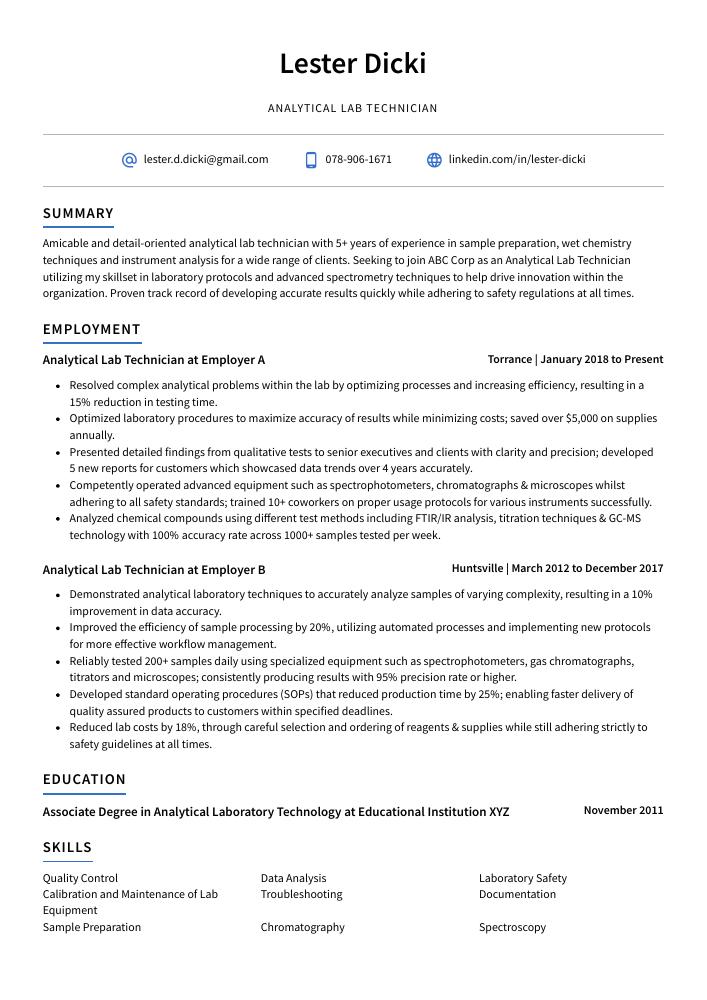Analytical Lab Technician Resume Guide
Analytical lab technicians analyze samples of materials such as air, water, soil and food to determine their chemical composition. They use a variety of laboratory instruments and techniques to perform tests on the samples according to established protocols. The results are then used by chemists or other scientists in research or product development activities.
You’re the perfect fit for any laboratory, but potential employers don’t know your name yet. To let them discover what a capable technician you are, you must produce an outstanding resume that demonstrates your qualifications and experience.
This guide will walk you through the entire process of creating a top-notch resume. We first show you a complete example and then break down what each resume section should look like.
Table of Contents
The guide is divided into sections for your convenience. You can read it from beginning to end or use the table of contents below to jump to a specific part.
Analytical Lab Technician Resume Sample
Lester Dicki
Analytical Lab Technician
[email protected]
078-906-1671
linkedin.com/in/lester-dicki
Summary
Amicable and detail-oriented analytical lab technician with 5+ years of experience in sample preparation, wet chemistry techniques and instrument analysis for a wide range of clients. Seeking to join ABC Corp as an Analytical Lab Technician utilizing my skillset in laboratory protocols and advanced spectrometry techniques to help drive innovation within the organization. Proven track record of developing accurate results quickly while adhering to safety regulations at all times.
Experience
Analytical Lab Technician, Employer A
Torrance, Jan 2018 – Present
- Resolved complex analytical problems within the lab by optimizing processes and increasing efficiency, resulting in a 15% reduction in testing time.
- Optimized laboratory procedures to maximize accuracy of results while minimizing costs; saved over $5,000 on supplies annually.
- Presented detailed findings from qualitative tests to senior executives and clients with clarity and precision; developed 5 new reports for customers which showcased data trends over 4 years accurately.
- Competently operated advanced equipment such as spectrophotometers, chromatographs & microscopes whilst adhering to all safety standards; trained 10+ coworkers on proper usage protocols for various instruments successfully.
- Analyzed chemical compounds using different test methods including FTIR/IR analysis, titration techniques & GC-MS technology with 100% accuracy rate across 1000+ samples tested per week.
Analytical Lab Technician, Employer B
Huntsville, Mar 2012 – Dec 2017
- Demonstrated analytical laboratory techniques to accurately analyze samples of varying complexity, resulting in a 10% improvement in data accuracy.
- Improved the efficiency of sample processing by 20%, utilizing automated processes and implementing new protocols for more effective workflow management.
- Reliably tested 200+ samples daily using specialized equipment such as spectrophotometers, gas chromatographs, titrators and microscopes; consistently producing results with 95% precision rate or higher.
- Developed standard operating procedures (SOPs) that reduced production time by 25%; enabling faster delivery of quality assured products to customers within specified deadlines.
- Reduced lab costs by 18%, through careful selection and ordering of reagents & supplies while still adhering strictly to safety guidelines at all times.
Skills
- Quality Control
- Data Analysis
- Laboratory Safety
- Calibration and Maintenance of Lab Equipment
- Troubleshooting
- Documentation
- Sample Preparation
- Chromatography
- Spectroscopy
Education
Associate Degree in Analytical Laboratory Technology
Educational Institution XYZ
Nov 2011
Certifications
Certified Clinical Laboratory Technician (CCLT)
American Medical Technologists
May 2017
1. Summary / Objective
A resume summary/objective for an analytical lab technician should highlight your experience and qualifications in the field. For example, you could mention how many years of laboratory experience you have, any certifications or specializations that make you stand out from other candidates, and the types of equipment with which you are familiar. You can also include a brief statement about why this type of work interests you and what makes it rewarding for you.
Below are some resume summary examples:
Well-rounded analytical lab technician with 8+ years of experience in the field. Experienced at developing and executing complex scientific experiments, analyzing data and results, maintaining laboratory equipment, and writing reports. At XYZ Lab achieved a 20% reduction in turnaround time for sample analysis by introducing new protocols and procedures. Highly organized with an eye for detail, efficient problem-solver who is passionate about science research.
Committed analytical lab technician with 5+ years of experience in testing and analyzing physical, chemical, and biological samples. Skilled in operating advanced laboratory equipment to identify potential risks or contamination. Adept at recording results accurately while meeting tight deadlines and adhering to safety protocols. Seeking to join ABC Lab as a lab technician where I can utilize my skillset for the benefit of the organization’s research efforts.
Reliable analytical lab technician with experience in using laboratory instruments such as HPLC and GC-MS to analyze samples. At XYZ, conducted sample analysis for food products used in the production of beverages. Trained new staff on instrument operation and demonstrated strong problem solving skills when resolving errors or malfunctions. Seeking to bring expertise to ABC Lab’s analytical team by providing precise data collection and reporting services.
Driven analytical lab technician with over 5 years of experience in data collection, analysis and reporting. Skilled at developing timely laboratory reports for various projects within established quality control parameters. At XYZ Inc., designed a comprehensive database to track sample information which improved the efficiency of report-writing by 40%. Experienced with multiple analytical instruments such as HPLC, GCMS and FTIR spectrometers.
Enthusiastic analytical lab technician with four years of experience in the field. Proven ability to collect, analyze and interpret data from a variety of sources. Experienced in developing and executing laboratory experiments for research projects across multiple industries including food, beverages and pharmaceuticals. Skilled at troubleshooting instrumentation issues quickly and accurately while providing exceptional customer service.
Seasoned analytical lab technician with 5+ years of experience in a fast-paced laboratory environment. Experienced in performing complex chemical analyses, troubleshooting and calibrating instruments, preparing samples for testing, and executing tests to ensure accuracy of results. Meticulous attention to detail ensures that all quality control standards are met according to industry regulations.
Passionate analytical lab technician with over six years of experience in the chemical and biological sciences. Seeking to join ABC Research Labs to utilize my knowledge of analytical methods, testing protocols, data analysis software, and laboratory safety regulations. Key achievements include a 14% increase in accuracy by developing new quality control procedures.
Proficient analytical lab technician with 5+ years of experience in performing forensic analysis on a wide range of samples. Seeking to bring knowledge and expertise to ABC Labs, where I can utilize my skillset for the benefit of clients and contribute to research activities. Achieved 97% accuracy rate when analyzing results from complex medical tests at XYZ Lab.
2. Experience / Employment
The work history/experience section of your resume is where you provide details on the roles you’ve held. List them in reverse chronological order, with your most recent job listed first.
When writing this section, use bullet points to make it easier for the reader to digest what you have to say quickly and efficiently. You want to be sure that each point contains detail about what tasks were completed and any results achieved from those tasks.
For example, instead of saying “Performed chemical tests,” you could say, “Conducted quantitative analysis of samples using HPLC/GC-MS equipment; ensured accuracy by calibrating instruments daily.”
To write effective bullet points, begin with a strong verb or adverb. Industry specific verbs to use are:
- Analyzed
- Monitored
- Recorded
- Operated
- Calibrated
- Tested
- Prepared
- Inspected
- Evaluated
- Processed
- Assessed
- Interpreted
- Documented
- Troubleshot
- Resolved
Other general verbs you can use are:
- Achieved
- Advised
- Compiled
- Coordinated
- Demonstrated
- Developed
- Expedited
- Facilitated
- Formulated
- Improved
- Introduced
- Mentored
- Optimized
- Participated
- Presented
- Reduced
- Reorganized
- Represented
- Revised
- Spearheaded
- Streamlined
- Structured
- Utilized
Below are some example bullet points:
- Calibrated and maintained lab equipment and instruments to ensure accuracy of results; increased precision of measurements by 20%.
- Inspected a wide range of samples for chemical composition, pH levels, viscosity and other physical properties using advanced laboratory techniques; reduced turnaround time by 10 hours per month on average.
- Streamlined the workflow process in the laboratory setting by reorganizing storage shelves, labeling chemicals appropriately & installing new safety protocols; improved productivity rate by over 25%.
- Reorganized the data collection system from manual logbook entries to an interactive computer software program which enabled faster data analysis and retrieval with minimal effort expended.
- Actively participated in research projects involving complex organisms such as bacteria or fungi while working closely with senior scientists to develop testing procedures & publish findings in well-known scientific journals.
- Operated and maintained high-tech analytical equipment to perform routine and non-routine tests on soil, water and air samples; reduced analysis time by 25%.
- Introduced innovative laboratory procedures that resulted in a 20% reduction of errors in data collection and reporting.
- Participated in team projects involving environmental safety initiatives such as hazardous waste management systems; successfully completed 7 projects within budgeted timelines.
- Formulated comprehensive laboratory reports based on the results of experiments that included detailed statistical analyses, graphs and other visual representations; exceeded accuracy requirements for 98% of all reports submitted over 3 years period.
- Accurately monitored test parameters according to established protocols, ensuring quality control standards were met at all times while preventing contamination or sample loss due to mishandling issues during testing process.
- Expedited samples of 20+ types of laboratory materials, including chemicals, tissue samples and water specimens for analysis with an average turnaround time of 24 hours.
- Assessed and analyzed data from over 300 chemical tests conducted in the lab to detect contamination levels; identified discrepancies up to 0.01%, leading to a 15% drop in product recalls due to accuracy issues.
- Efficiently managed all laboratory equipment such as spectrophotometers, microscopes and chromatographs; reduced maintenance costs by 25%.
- Compiled detailed reports on test results identifying any potential problems or areas needing improvement; improved quality control processes by 30%.
- Prepared solutions for various experiments according to specific formulas, ensuring that each batch was accurately measured within 1/1000th part deviation from standard requirements.
- Tested environmental, chemical and industrial samples for accuracy using various laboratory instruments, achieving an average of 95% success rate over the last 3 years.
- Represented the department in meetings to discuss new lab equipment requirements, ensuring that all relevant safety protocols were followed at all times and reducing costs by $4,500 per annum.
- Confidently operated sophisticated machines such as spectrophotometers, pH meters and particle size analyzers; completed analysis on 500+ samples within 8 hours with a 0% error rate each day.
- Recorded accurate data from experiments into appropriate databases; maintained up-to-date records of results for reference purposes in future projects/research endeavors with 100% accuracy rating every month.
- Evaluated test findings against predetermined standards & specifications with excellent attention to detail; identified discrepancies promptly and recorded them accurately without fail during daily quality control inspections which resulted in zero product recalls or customer complaints since employment commencement date 2 years ago.
- Resourcefully conducted complex laboratory experiments, analyzed samples and interpreted data for over 30 projects with an average accuracy rate of 95%.
- Coordinated the preparation, testing and operation of analytical instruments in a lab setting; oversaw the daily maintenance activities to ensure accurate results were obtained at all times.
- Advised research teams on suitable protocols when analyzing chemical compounds as well as providing feedback on data quality control procedures; identified errors that caused discrepancies in 15+ reports resulting in more precise results.
- Mentored junior technicians through hands-on training sessions covering topics such as safety regulations, sample analysis techniques and proper documentation practices; achieved 85% reduction in time taken to complete tasks correctly within 6 months of instruction period.
- Documented detailed test plans from start to finish while adhering to strict deadlines outlined by client or project managers; ensured that records remain compliant with applicable laws & standards leading up to successful certification approval rates exceeding 80%.
- Proficiently performed chemical experiments, analyzed data and drew accurate scientific conclusions from results; reduced laboratory errors by 15%.
- Revised existing lab protocols to improve accuracy of test procedures and ensure compliance with safety regulations; improved laboratory efficiency by 25%.
- Interpreted complex technical information in order to identify problems, troubleshoot instrument malfunctions and suggest solutions for improvement; decreased equipment downtime by 40%.
- Spearheaded the development of new testing strategies while managing daily operations within a highly regulated environment, resulting in a 10% reduction in sample preparation time over 3 months.
- Troubleshot various issues related to chromatography instruments such as HPLCs & GC/MS systems according to manufacturer specifications; resolved 90% of reported incidents within 8 hours on average without any external assistance or intervention required.
- Independently conducted over 300 laboratory tests each week to analyze samples of raw materials, finished products and environmental sources; successfully identified anomalies in results and reported findings accurately.
- Utilized advanced analytical instruments such as HPLC, GCMS/GC-FID and FTIR systems for chemical analysis on different types of samples with precision; improved accuracy levels by 10%.
- Facilitated the development of new lab procedures related to sample preparation, data analysis & reporting protocols; reduced overall time for completing testing cycles by an average 20 hours per month.
- Monitored equipment performance regularly to ensure compliance with safety regulations and quality standards; prevented any downtime due to breakdowns or repairs through effective maintenance scheduling resulting in $500 savings per quarter.
- Structured a training program for junior scientists on basic lab techniques based on industry best practices that improved their efficiency by 25% within three months from onboarding.
3. Skills
Even though two organizations are hiring for the same role, the skillset they want an ideal candidate to possess could differ significantly. For instance, one may be on the lookout for an individual with experience in chromatography, while the other may be looking for someone with knowledge of spectrophotometry.
Therefore, it is important to tailor your skills section according to each job that you are applying for. This way, employers utilizing applicant tracking systems will recognize that you have what they need and pass on your resume accordingly.
In addition to listing relevant skills here, make sure to discuss them further in other areas such as the summary or experience sections; this will help demonstrate how well-versed you are in those particular topics.
Below is a list of common skills & terms:
- Calibration and Maintenance of Lab Equipment
- Chromatography
- Data Analysis
- Documentation
- Laboratory Safety
- Microbiology Techniques
- Quality Control
- Sample Preparation
- Spectroscopy
- Troubleshooting
4. Education
Mentioning an education section on your resume will depend on how far along you are in your career. If you have just graduated and don’t have any work experience, include the education section below your resume objective. However, if you possess significant work experience that is relevant to the analytical lab technician role, it might be best to omit an education section altogether.
If including an education section, focus on courses and subjects related to laboratory analysis or chemical engineering which demonstrate a good understanding of the job requirements for an analytical lab technician position.
Associate Degree in Analytical Laboratory Technology
Educational Institution XYZ
Nov 2011
5. Certifications
Certifications are a great way to demonstrate your expertise in a certain field. Employers will be interested in seeing what certifications you have and if they are relevant to the job you are applying for.
Including any applicable certifications on your resume can help show potential employers that you possess the necessary skills and knowledge required for the position, making it easier for them to decide whether or not you would be an ideal candidate.
Certified Clinical Laboratory Technician (CCLT)
American Medical Technologists
May 2017
6. Contact Info
Your name should be the first thing a reader sees when viewing your resume, so ensure its positioning is prominent. Your phone number should be written in the most commonly used format in your country/city/state, and your email address should be professional.
You can also choose to include a link to your LinkedIn profile, personal website, or other online platforms relevant to your industry.
Finally, name your resume file appropriately to help hiring managers; for Lester Dicki, this would be Lester-Dicki-resume.pdf or Lester-Dicki-resume.docx.
7. Cover Letter
Submitting a cover letter with your job application is a great way to make an impression on the hiring manager. This document should consist of 2 to 4 paragraphs that explain why you are perfect for this role and what makes you stand out from other applicants.
Cover letters can be just as important as a resume, providing recruiters with deeper insight into who you are and what qualifications or experience you possess. Even if it’s not required by the position, writing one could give your job hunt an edge over others competing for the same job.
Below is an example cover letter:
Dear Delmer,
I am writing to apply for the Analytical Lab Technician position at [company name]. With a degree in Chemistry and experience working in both industrial and research settings, I have the skills and knowledge necessary to excel in this role.
In my current position as an analytical lab technician at [company name], I am responsible for running various tests on samples using different techniques such as UV-Vis spectroscopy, titration, and gas chromatography. I have also been trained in methods such as atomic absorption spectroscopy (AAS) and inductively coupled plasma mass spectrometry (ICP-MS). My experience has given me a strong foundation in wet chemistry, which I believe will be beneficial in this role.
I am also experienced in data analysis and report writing, having prepared numerous reports detailing the results of my experiments. In addition, I am proficient in Microsoft Office applications such as Word and Excel. These skills would come in handy when preparing laboratory reports or analyzing data collected from experiments.
Furthermore, I possess excellent problem-solving skills that allow me to troubleshoot issues that may arise during experiments. My ability to work independently or as part of a team makes me an asset to any organization.
Overall, I believe that my qualifications make me the perfect candidate for this position. I look forward to putting my skills to use for your company and contributing to your success. Thank you for your time and consideration; please do not hesitate to contact me if you have any questions about my application.
Sincerely,
Lester
Analytical Lab Technician Resume Templates
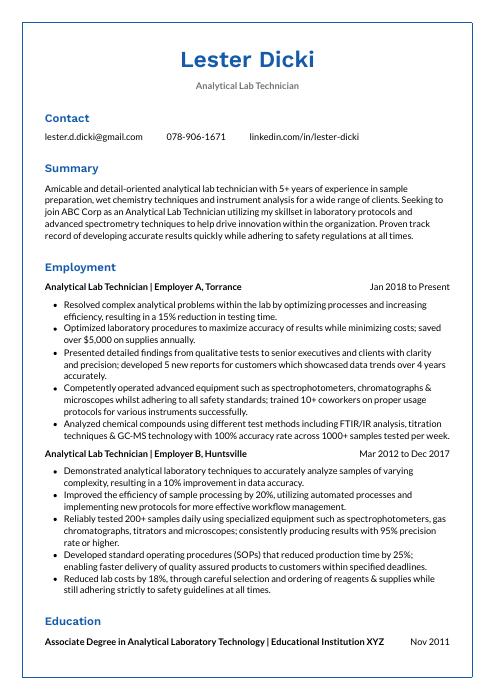 Markhor
Markhor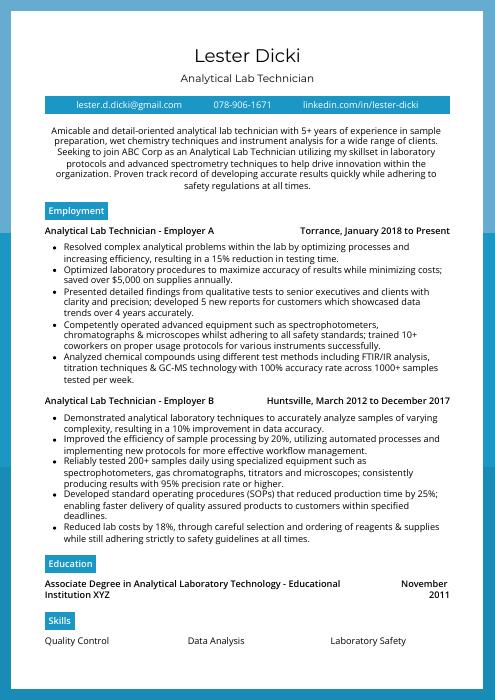 Rhea
Rhea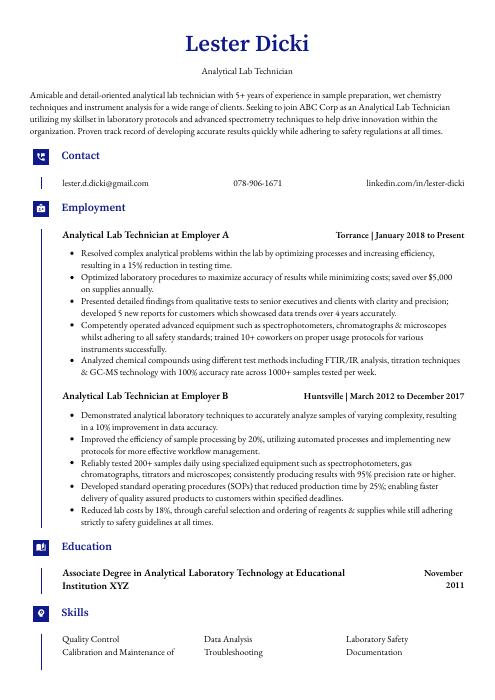 Gharial
Gharial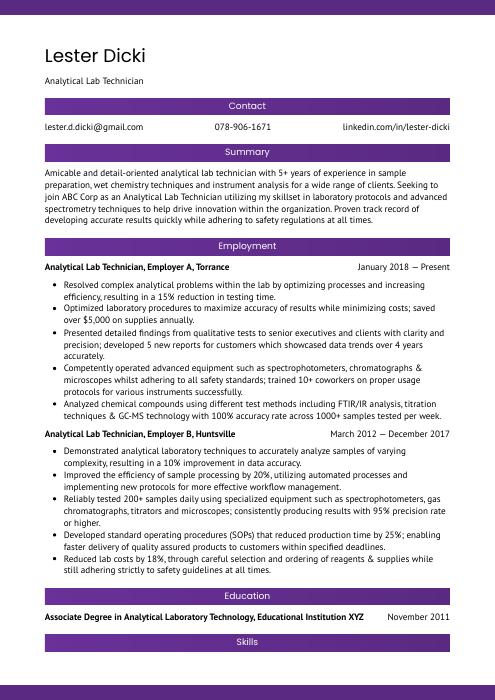 Jerboa
Jerboa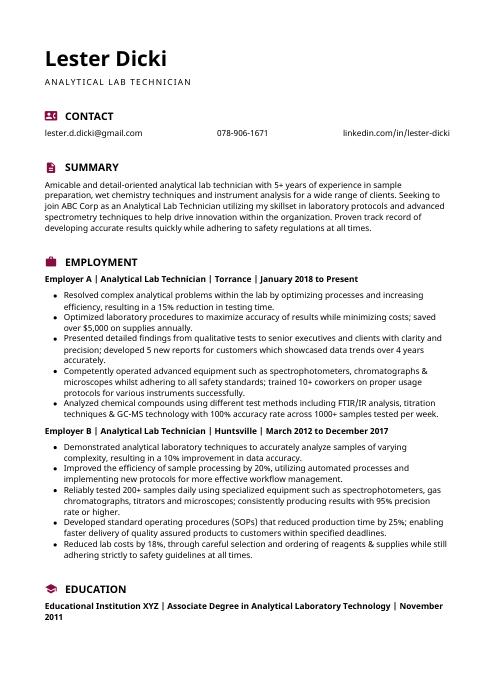 Hoopoe
Hoopoe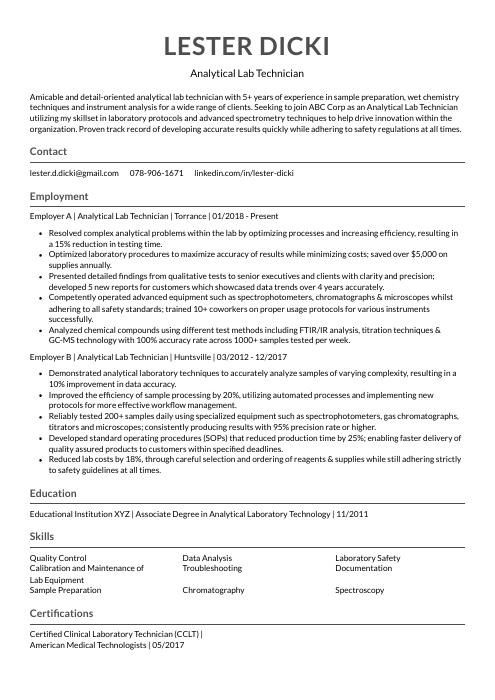 Indri
Indri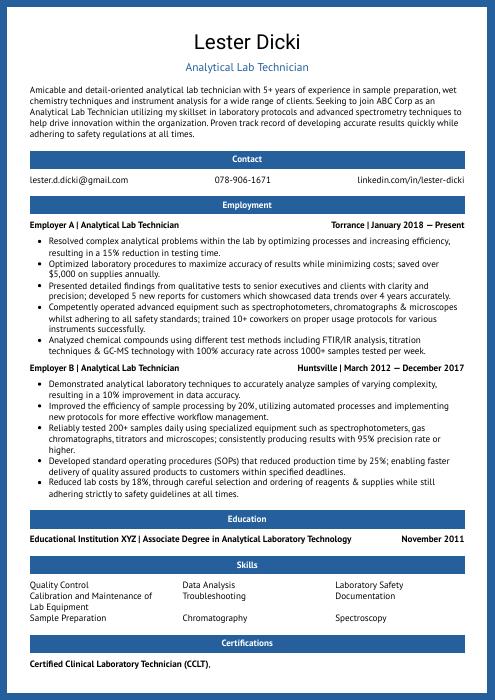 Ocelot
Ocelot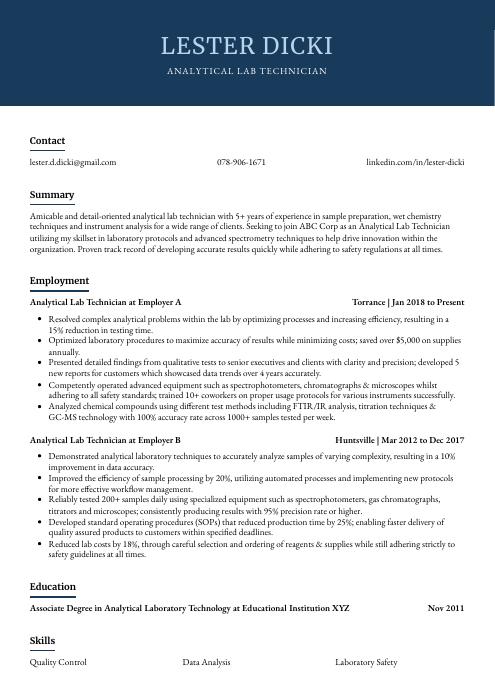 Bonobo
Bonobo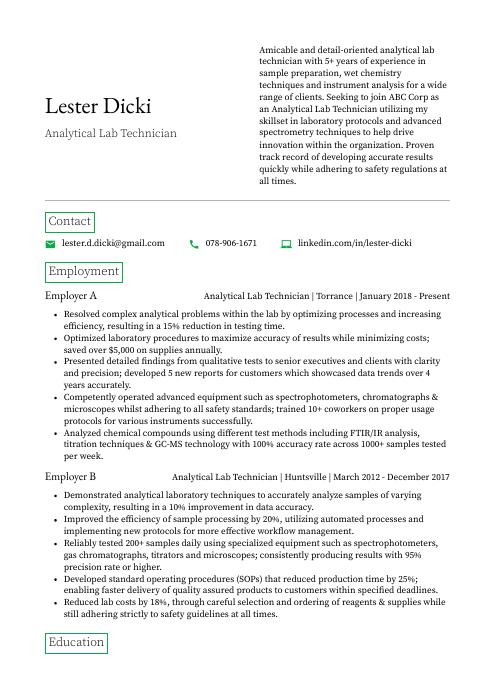 Quokka
Quokka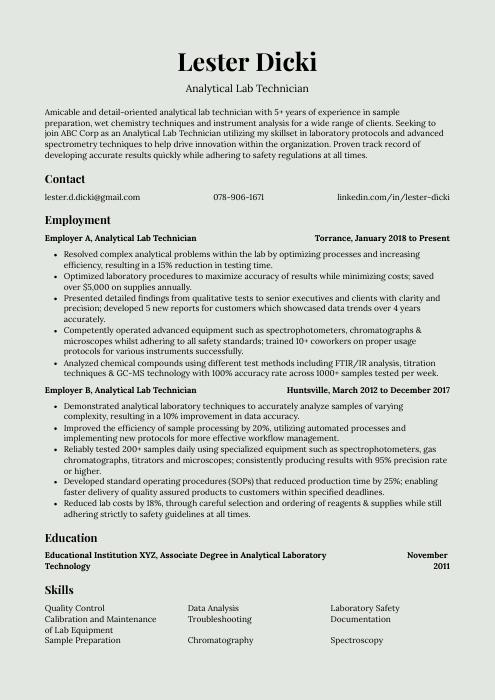 Saola
Saola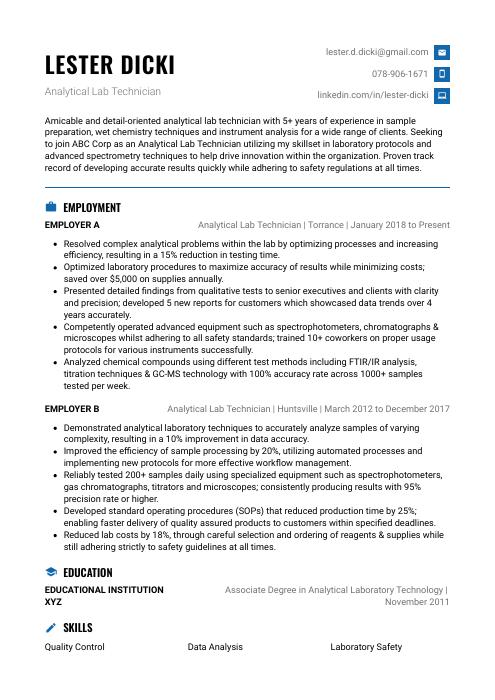 Echidna
Echidna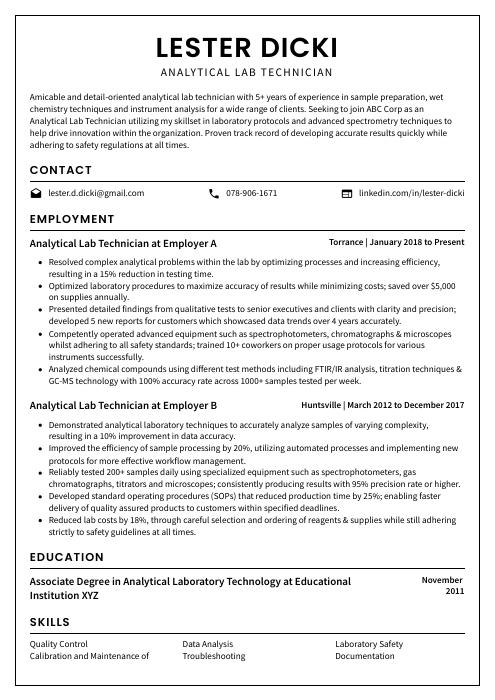 Cormorant
Cormorant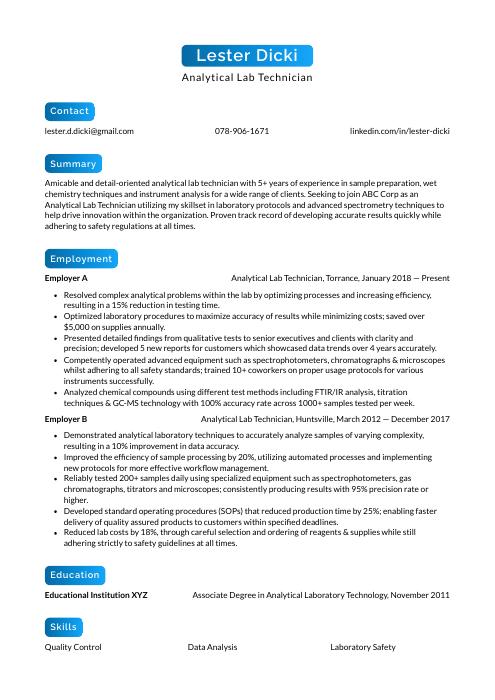 Kinkajou
Kinkajou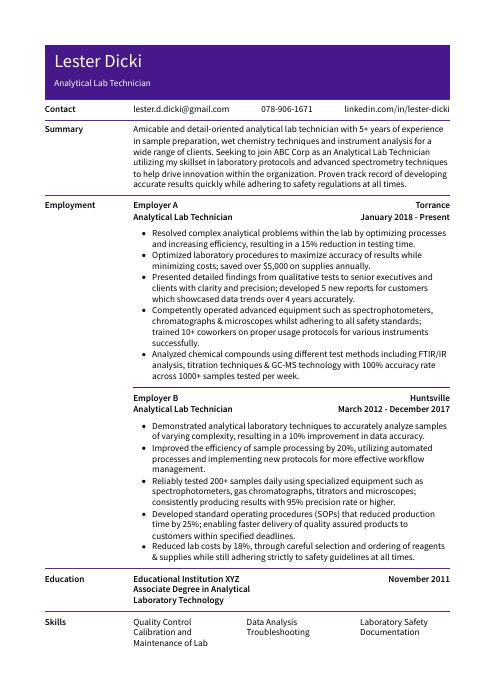 Pika
Pika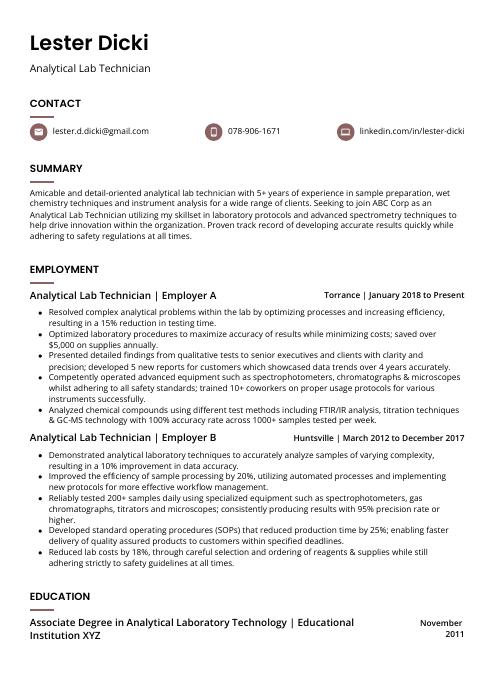 Fossa
Fossa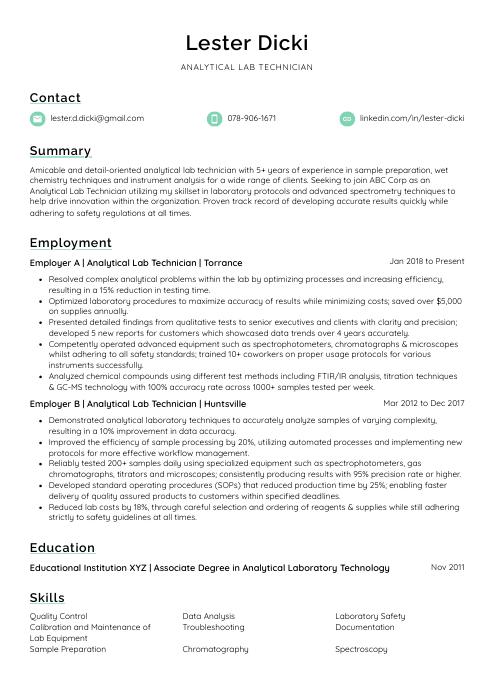 Lorikeet
Lorikeet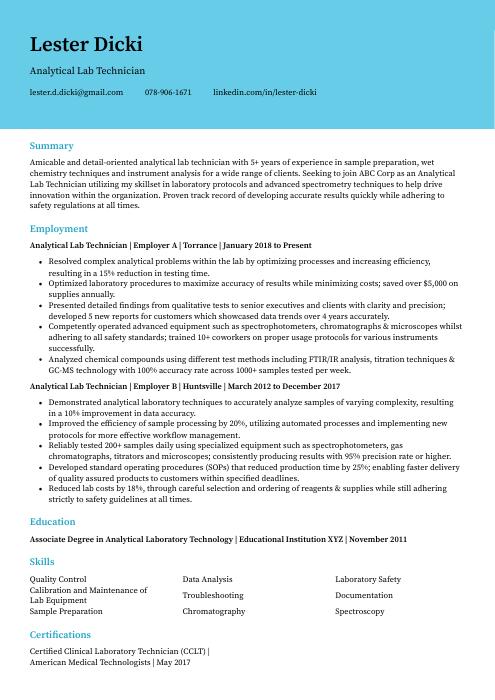 Dugong
Dugong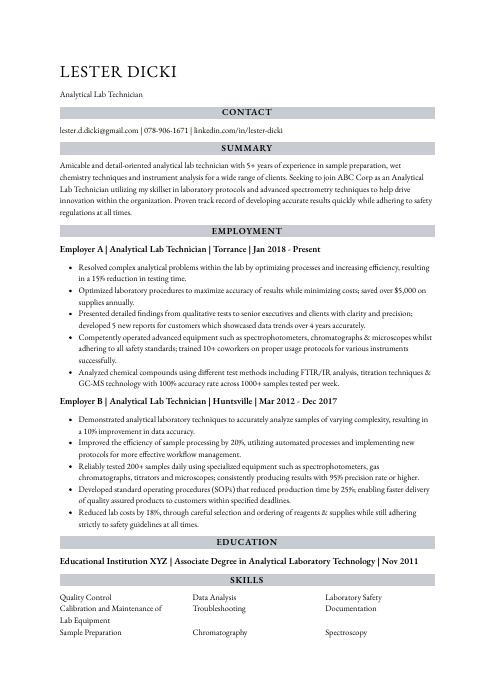 Numbat
Numbat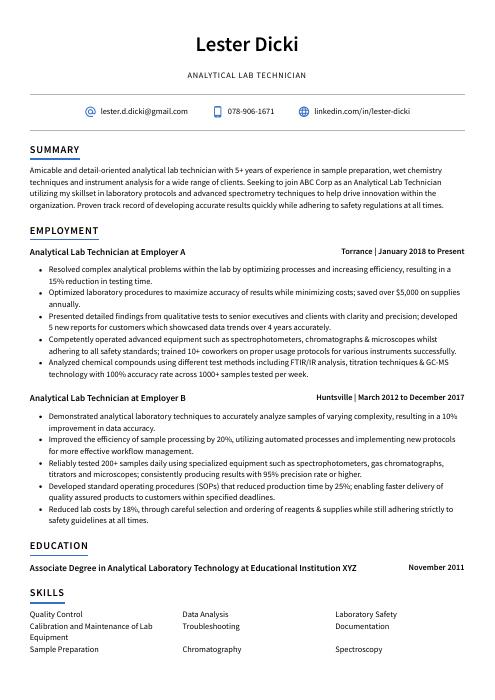 Axolotl
Axolotl Rezjumei
Rezjumei
